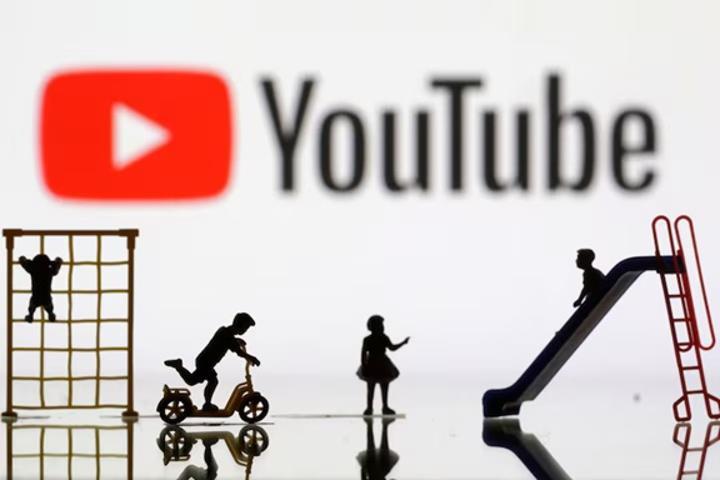Africa-Press – Mauritius. Through its 26-year run, a 6,000% run-up in its share price, and dominance of the global search engine market, Google owner Alphabet has become a $1.8 trillion internet goliath. It operates the world’s most popular operating system in Android, developed some of the crucial technological innovations behind artificial intelligence, and runs a colossal cloud computing service. Only among this jumble of assets could YouTube, now the most-watched source of video content, seem almost lost in the shuffle. As rapid shifts in AI shake its search foundations, investors may be overlooking a $500 billion star inside the company.
Exactly 20 years ago, when Netflix was still a mail-order DVD service, former PayPal employees Steve Chen, Chad Hurley, and Jawed Karim posted the social media platform’s first short, a 19-second clip entitled “Me at the zoo.” The open invitation for anyone to upload and share quickly caught fire; the same year, comedy show “Saturday Night Live” posted a sketch featuring comedians Andy Samberg and Chris Parnell in a Beastie Boys music spoof.
Google snapped up YouTube for $1.7 billion in stock to complement its mission “to organize the world’s information.” Since the deal closed in 2007, the platform has flourished. According to ratings firm Nielsen, in March of this year, YouTube accounted for 12% of all television usage in the United States – putting it ahead of all traditional sources like Walt Disney, Netflix or Comcast’s NBC.
This doesn’t just go for iPad-toting kids: Adults 35 years and older make up half of viewers. Sure, the legion of celebrities minted by the service – like MrBeast, Dude Perfect and PewDiePie – have a certain adolescent appeal. But analysts at MoffettNathanson forecast that YouTube’s subscription services will surpass cable operators Comcast and Charter Communications by the end of next year, with nearly 11 million members.
Nonetheless, it has not won its parent company an outsized valuation. The ratio of Alphabet’s enterprise value to estimated 2026 EBITDA is lower than at Meta Platforms, Microsoft and Apple, according to Visible Alpha.
Problems elsewhere might be part of it. Advertising shown alongside Google’s ubiquitous search results accounted for 57% of Alphabet’s $350 billion in revenue last year. Search can, fundamentally, be broken down by how it’s used: queries for general information, say; or a hunt for a product to buy. When it comes to digging up information, the explosion of chatbots like OpenAI’s ChatGPT are a rising threat. The ease of asking a know-it-all robot for answers gets around the hassle of scouring search results entirely.
Still, countless recent US presidents have expressed a contradictory view on the world’s second largest economy, Perhaps sensing the danger, Google has started prominently including its own AI-generated summaries at the top of search pages, sticking them in nearly 43% of results at the end of last year, according to one study, opens new tab. But that risks stealing eyeballs from the links that are Google’s value proposition to website owners and advertisers: clickthrough rates declined over 7% quarter-over-quarter on desktop for queries using terms like “what,” “when,” “where” and “how.”
For shopping searches, meanwhile, specialized rivals are growing. More than half of Americans now start ecommerce queries on Amazon.com , according to eMarketer. Amid these pressures, Google’s slice of the overall global search advertising market dipped to 89.8% in January from 93.1% in May 2023, according to Bank of America citing research from Statcounter. ChatGPT may have eaten up as much as 15% of Google’s query volume, Bernstein analysts reckon.
AI at least aids Alphabet’s cloud computing division, which supplies rented muscle for crunching the bits behind the chatbots. Revenue increased 64% to $43 billion in 2024 compared to two years prior. But the company is a perennial third place behind Amazon and Microsoft. Its $32 billion acquisition of Wiz, announced in March, is a move to catch up by offering cyber security. Still, Chief Executive Sundar Pichai looks to be overpaying, and regulators could look askance.
Indeed, trustbusters already want to pare back Google’s clout. Judges have now found that Alphabet runs an illegal monopoly in both the search and digital advertising markets. Government litigators want to break off key units like the Chrome web browser and are specifically warning about Alphabet’s role in the AI race.
That places a spotlight on YouTube. Since its content is community-generated, it doesn’t bear the burden of stumping up like Netflix, which reports content obligations through March of $22 billion. However, Alphabet shares roughly 50% of advertising revenue with monetized accounts. That means slimmer operating margins than the service behind “Adolescence.”
A push into subscriptions for the generally free-to-watch platform helps. Wall Street analysts expect YouTube will rake in more than one-third of its revenue from its Premium plan, which includes music, and its more costly traditional-TV-replacement streaming bundle, according to Visible Alpha. All told, YouTube is forecast to generate $70 billion in total revenue in 2026. Valued at 7 times, a tick under Netflix’s multiple, the enterprise is worth $490 billion.
Unscrambling that from Alphabet’s other units is tricky. Goldman Sachs analysts say that the cloud business could be worth some 30 times its estimated operating profit of approximately $14 billion next year. Search, advertising and services, meanwhile, might generate a little more than $116 billion of such profit, assuming a 40% margin on forecast revenue. Apply Alphabet’s overall 12-times multiple to that number, add the two together, and that’s $1.8 trillion of value.
Total it all up, add in net cash, and the company’s market capitalization would be $2.4 trillion, or a third above where it is today. A recession, the likelihood of which is increasing rapidly, could very well wallop Google and YouTube. Advertisers, especially brand marketers – whom YouTube is preparing to court at an event in May – could pull back sharply if consumers turn glum. Overall, U.S. advertising could contract by $50 billion in a downturn, more than 11%, according to MoffettNathanson estimates.
Then again, entertainment has thrived during economic crises. Hollywood’s golden age dawned at the onset of the Great Depression. Deep links into Alphabet’s overall advertising guts probably make any separation difficult. But with regulators pushing a breakup in other areas and problems mounting in its core business, YouTube looks deserving of a star status that investors, thus far, seem to have overlooked.
For More News And Analysis About Mauritius Follow Africa-Press







